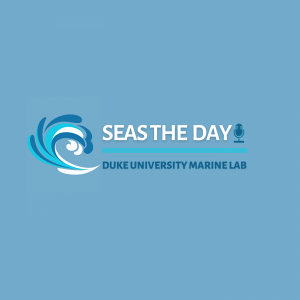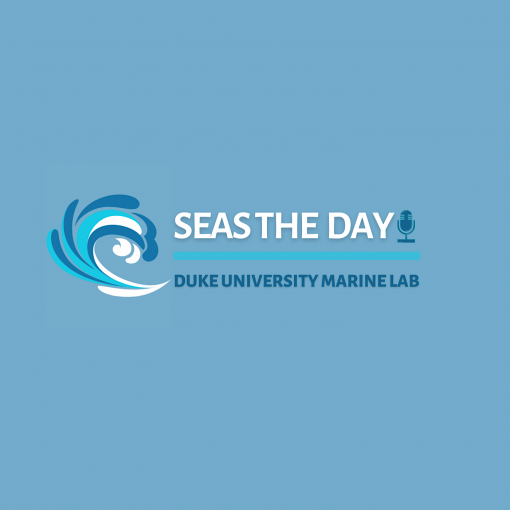On this episode, Lillian Dukes, Haoyang Tang, and Franny Oppenheimer address the current status of the North Atlantic right whale and the threats they face like entanglements, ship strikes, and climate change. The episode also explores management measures that have been taken to protect them and considers the future of this critically endangered whale.
Listen Now
Episode Hosts

Lillian Dukes is a senior at Duke University pursuing a B.S. in Biology, a minor in Korean, and a Science and Society Certificate. A native of Georgia, her interests in marine wildlife began with frequent visits to the Georgia Aquarium as a child and have only grown since at Duke. Studying cetaceans under the guidance of Dr. Reny Tyson Moore last summer allowed her to combine her interests in evolutionary genomics, language, and manifestations of empathy. She hopes this podcast inspires others to become involved with their local marine wildlife as she was upon discovering that the North Atlantic Right Whale is Georgia’s state marine mammal. Thanks to Haoyang, Franny, and our interviewees for collaborating on a wonderful project!
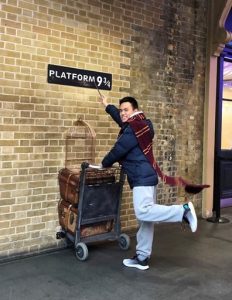
Haoyang Tang is a junior at Duke Kunshan University. He is majoring in Environmental Science in the Chemistry track. He enjoys learning about animals, ecosystems, and anything related to nature. He took Reny Tyson Moore’s Marine Mammal course last summer and really enjoyed it.
Twitter: @iamaarontang
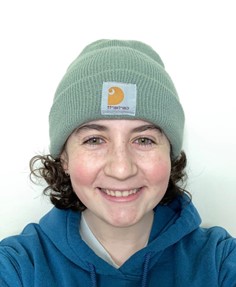
Franny Oppenheimer is a first-year undergraduate student at the University of Vermont earning a bachelor’s degree in Marine Science. She enjoys being outside, reading, playing frisbee, and all things ocean!
Interviewees
Amanda Bradford, Ph.D.
Dr. Bradford is a research ecologist who currently works with NOAA at the Pacific Islands Fisheries Science Center.
Caroline Good, Ph.D.
Dr. Good is a scientist working as part of the National Marine Fisheries Services’ Office of Protected Resources “Large Whale Team.” Her research and policy work focuses primarily on North Atlantic Right Whales.
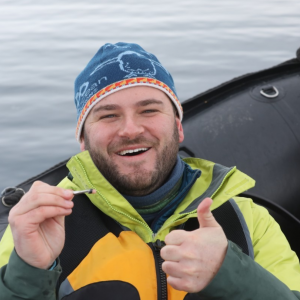
Logan Pallin
Logan Pallin is a National Science Foundation Graduate Research Fellow and a Ph.D. student in the Ecology and Evolutionary Biology Department of the University of California, Santa Cruz. His current work focuses on the conservation of humpback whales in the Antarctic.
Series Host
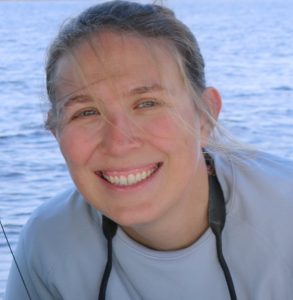
Dr. Reny Tyson Moore host the Whale Pod series. She is a broadly trained interdisciplinary behavioral ecologist with expertise in marine mammal bioacoustics, photographic-identification, population biology, and bio-logging tools and techniques. She is currently a staff scientist with Chicago Zoological Society’s Sarasota Dolphin Research Program and a contractor for NOAA Fisheries Office of Protected Resources through Ocean Associates Inc. Reny received her PhD from Duke University in Marine Science and Conservation, where she used high-resolution acoustic and movement tags to study the fine-scale foraging behaviors of humpback whales along the Antarctic Western Peninsula. Before this, Reny obtained her BSc and MSc from Florida State University where she examined nonlinearites in cetacean vocalizations and determined the abundance and community structure of bottlenose dolphins in the Big Bend of Florida. She went on to apply her skills as a Postdoctoral Research Fellow and Scientific Committee of Antarctic Science Fellow at the Institute for Marine and Antarctic Science, based at the University of Tasmania in Hobart, Australia, and then as a postdoctoral scientist with the Chicago Zoological Society’s Sarasota Dolphin Research Program. Reny has published or been a co-author on many peer- reviewed scientific articles, technical reports, conference papers, children’s books, and conference and workshop presentations. She also serves as a mentor and teacher for undergraduate and graduate students at various institutions, including the Duke University Marine Lab.

Supplemental material for this episode
“Oyster Waltz” by Joe Morton plays
Reny Tyson Moore: Hello and welcome back to what will be our final episode of the Whale Pod Series for this year here on Seas the Day. I know…its very sad, but as always we have a great episode lined up for you. Today, Duke students Lillian Dukes, Franny Openheimer, and Haoyang Tang explore the story of the North Atlantic Right Whale – one of the world’s most endangered large whale species, with fewer than 400 individuals remaining. They speak with Dr. Amanda Bradford, Dr. Caroline Good, and PhD student Login Palin about the life history and ecology of these whales, and some of the current challenges they are facing. Like so many of the stories you have heard here on our Whale Pod Series, the North Atlantic right whale are struggling to survive because of our actions. We’re hopeful that by telling their stories here on Seas the Day we can help bring awareness to these species and their plight. We hope you enjoy listening!
Lillian: The International Union for the Conservation of Nature (IUCN) recently updated their Red List of Critically Endangered Species to include 31% of all lemur species, the European Hamster, and the North Atlantic Right Whale (Eubalaena glacialis).1 The North Atlantic Right Whale, cousin to the cryptic North Pacific Right Whale and the prolific Southern Right Whale, is unfortunately no stranger to this list. Although a 1935 international ban on whaling Right Whales–a moniker they originally earned by being the “right” whale to hunt–was the first of many attempts to save their population from extinction, human activity has again reduced their population to around 4002; that is, “one step away from extinction.”1 Join me, Lily Dukes, and my partners…
Franny: Franny Oppenheimer
Haoyang: and Haoyang Tang
Lillian: Three Duke students who have made it our mission to investigate the current status and conservation efforts of the North Atlantic Right Whale, the Right Whale to Save.
Haoyang: Before we discuss the current threats NARWs face, an important question one may ask is why do we protect whales in the first place? Dr. Amanda Bradford, a scientist at the Pacific Islands Fisheries Science Center, explained why protection is important. Amanda, what can you tell me about the importance of conservation?
Bradford: We have to make sure that people do understand or place a value on marine mammals or whatever species we’re trying to protect. I think the answer to that question really depends on the values of each of us as individuals. So for the work that I do at NOAA Fisheries, we value maintaining each and every population of whales as what we call functioning units of their ecosystem. In other words, for an ecosystem to be healthy, each part of it needs to be able to survive and thrive at sustainable levels. And those healthy marine ecosystems will benefit us. They give us food to eat, they give us beautiful places to visit, and they give us amazing animals to look at. So depending on who you are as an individual, one or more specific things may be more important; especially for these really small populations. Once they’re gone they’re gone, you can’t get them back. There could be this cascade of things that happen because a key part of an ecosystem is missing.
Haoyang: Indeed, whales are a key part of their ecosystem. Despite their large appearance– NARWs can grow up to be 50-feet long and 70 tons of grey blubbery whale–, North Atlantic right whales feed on tiny, tiny organisms: copepods, krill, and zooplankton.2 They then give back nutrients by releasing what biologists called ‘fecal plumes’, that is vast outpouring of excrement that are rich in iron and nitrogen to the surface water. These nutrients fertilize phytoplankton, small ocean plants that only live in the surface water, that in turn serve as the food source for zooplanktons and small fish. Consequently, whales play a critical role in this cycle and as the number of great whales decline, the number of krill and fish also decline. Furthermore, phytoplankton fertilized by whales also consume thousands of tons of carbon dioxide and generate over 50 percent of oxygen on the earth.3 So, the recovery of NARWs proves to be another “right” way to fight climate change. Lily, what can you tell us about the North Atlantic Right Whale?
Lillian: Okay Haoyang, If you were given a chart of whales, could you pick out the “right whale to hunt”? In other words, what makes a whale “right” to hunt in the first place? To answer this question (and many more) I turned to Dr. Caroline Good, a scientist for the National Marine Fisheries Services’ (NMFS) Office of Protected Resources “Large Whale Team”. Dr. Good’s research and policy work has focused on NARWs as they need the most help. She explained to me why that was the case. Dr. Good, I’m really curious: why is this whale the right whale?
Good: So right whales are a really interesting species: they were one of the earliest species that was hunted on a large scale and then almost sort of an industrial scale really early on because they have very, very thick blubber and are just slightly positively buoyant as a result. So if you killed one or if you harpooned one, they tend to float which means that you’re going to recover the carcass and be able to harvest that blubber for oil. and also they have extremely long baleen—baleen that’s up to 6-feet long—and so, as a result,– baleen was almost the plastics of its day, you know. It could be molded into buggy whips and corset stays and all sorts of things that were in demand back in the day and so that it was called whalebone, the baleen was called whale bone. So, the whale bone and the whale oil were both very valuable products and as a result you got 2 for one in the Right Whale.
Lillian: Not only were the whales themselves good resources, but their habitat and behavior made them an even easier target.
Good: They also tend to have a more coastal distribution: they stay closer to shore than other large whales. They are not as fast as a blue whale or a fin whale. There’s a lot of reasons why they were targeted: they were easier to find, easier to catch, and easier to harvest products from. So that’s one of the reasons they were haunted so early on and across the entire North Atlantic both in Europe and in North America as well.
Lillian: In other words, a slow, buoyant, and resource rich whale? Unfortunately, these are the qualities that made the North Atlantic Right Whale “right” to hunt. Because of whaling, we have seen their numbers shrink from an estimated tens of thousands to hundreds and their habitat range shrink from the entire Atlantic Ocean to primarily the Eastern coast of the US and Canada.2
Lillian: By now, some of you may be thinking: “but wait, I’ve never owned a whalebone corset, or lit a whale oil lamp.” And although NARWs aren’t purposefully targeted as they were before, modern-day human activity– entanglement in fishing gear, vessel strikes, and climate change–continues to threaten North Atlantic Right Whales.2 Dr. Good explains that their unique behavior again makes them especially susceptible to these often-fatal run-ins with human activity. And the main motivation for their behavior? Food. Dr. Good, I’m really curious: what does food have to do with all this?
Good: So they have this super long baleen and they are different from any of the other rorquals, who are lunge feeders. So, when you think of humpback whales or Fin whales, you know, they’ll sort of lunge and open up their mouth and close it really quick and then strain out the water. But right whales, similar to bowheads, are ram feeders.
Lillian: In other words, think of NARWs as giant roombas: they open their mouths and swim slowly through huge patches of zooplankton, which gets filtered through their sieve-like baleen. To maintain their body size, these patches of food have to be substantial, which is a source of vulnerability for these more passive feeders.
Good: And so they essentially are to some degree at the mercy of the ocean not only to produce this food in generally enough abundance, but also they are at the mercy of the physical oceanography and tidal factors that aggregate that food into these super super dense patches that enable them to be able to forage in a way that’s energetically efficient.
Lillian: But hidden amongst these dense patches of zooplankton and within the NARWs’ habitat-at-large lies a major threat: non-mobile fishing gear. Living in coastal areas along Canada and the United States with active fishing activities, NARWs’ passive and relatively non-picky foraging strategy makes them especially vulnerable to entanglement with fishing gear. In their 30-year retrospective published in 2012, Amy Knowlton and colleagues found that 59% of the 629 individual NARWs they surveyed had been entangled more than once in their lifetime.4
Haoyang: Whales that are unable to shed the gear could die of injury, infection, and starvation. Both living and dead NARWs have been documented with rope through their mouths and wrapped around flippers and flukes.4 Dr. Good will explain how the National Marine Fisheries Service convened the Atlantic Large Whale Take Reduction Team in 1972 to develop a plan to reduce harm due to entanglement. Dr. Good, can you explain more about what they do?
Good: So the policy process with regards to entanglement related injuries tends to start with the Take Reduction Team for the North Atlantic right whale and at that team is where the agency is able to bring together fishermen and scientists and conservation NGO representatives, folks from state fishery organizations, fishing associations—sort of everybody— into one room. All the different stakeholders in groups that have either expertise or a vested interest in what is happening or are involved in what’s happening with entanglement, and try to work through what we know, what needs to happen, what we can do, and what everybody can essentially live with to be able to allow fishing to continue and at the same time give the conservation level that’s necessary and the risk reduction level that’s necessary for that species to recover.
Haoyang: Closing fisheries jeopardize the fishing industry. In Myers’ article, “ropeless fishing to prevent large whale entanglements: ropeless consortium report” published in Marine Policy in 2019, Myers pointed out that in 2019, fishermen have repeatedly requested access to fishing in these areas during closure periods.5 Canadian government announced a reduction in the areas subject to mandatory fisheries closures after consultations with stakeholders, which include the fishing industry.6 However, the result of the reduction in management areas was eight deaths by August in the Gulf of St. Lawrence, Canada, in 2019.7
Haoyang: Modifying fishing gear is also a method to protect North Atlantic Right Whales. In Canada, fishermen have already used ‘weak links’ in fishing gear to minimize the harm entanglements caused to the right whales. When right whales struggle when they are entangled, they are more likely to shed off the entangled ropes with weak links. And the ground line that connects all the lobster traps must be buried under the bottom of the ocean. But for a species that has only 400 individuals left, modifying fishing gear is not enough. Entanglements still happened and killed right whales. Seasonal closure of fisheries is still necessary. Davies and Brillant’s article, “Mass human-caused mortality spurs federal action to protect North Atlantic Right Whales in Canada,” published in Marine Policy in 2019, states that there is currently no effective management tool that allows fishing to continue unabated.8 But Myers stated in his article there might be a technological solution that can protect the NARW while leaving fishing industries intact. Ropeless fishing gear is an emerging technology that uses electromagnetic waves to detect the position of the traps instead of using ropes.9 If this technology is developed and proven effective, closure of fishery is not necessary, therefore leaves the fishery industries intact and protecting vulnerable marine wildlife. Although this technology is not ready to be used yet, Myers expressed the urgent need for developing this technology to eliminate the effects of entanglements while fulfilling fishermen’s desire to reopen the fisheries.
Lillian: However, Dr. Good explained that the mandates of the Take Reduction Team are such that they can only focus on entanglement and not ship strikes, another threat NARWs face as they inhabit coastal areas of high vessel traffic and fishing activity. She also explained that, for reasons unknown, it is difficult for these whales to avoid fast-coming vessels, and the resulting strikes can leave them with fatal wounds. More unfortunate still, in the report “Implementing Conservation Measures for the North Atlantic Right Whale: Considering the Behavioral Ontogeny of Mother-Calf Pairs” published in 2018, Dana Cusano and her team report that mother-calf pairs, a key demographic in trying to restore populations, are especially vulnerable to ship strikes due to their surface-dwelling behavior in the calving season.10 Haoyang, what are countries doing in response to whale vessel strikes?
Haoyang: Ah, yes. As part of an international effort, Canada and the United States have established a series of mandatory seasonal management areas since 2017 based on the seasonal migration route of the species to protect the species from ship strikes. In addition to seasonal closure of lobster fisheries in Canada and in the United States, there have also been seasonal speed restrictions for vessels in the management areas.11
Lillian: Furthermore, in 2008 the National Marine Fisheries Services passed a rather groundbreaking Ship Strike Reduction Rule, which required vessels to significantly lower their speed in certain locations along the East coast and during certain parts of the year in alignment with the habits of marine life.2 Dr. Good explained the rule was so successful in reducing whale and vessel collisions that it has since become an international standard.12 But Franny: Have all of these efforts been enough for our lovely North Atlantic Right Whale? With their current population numbers, it doesn’t seem like so.
Franny: The combined efforts of NMFS, commercial fisheries, and other stakeholders in reducing entanglement and ship strikes have overall been moderately successful. While their actions did correlate with an increase in NARW populations in the early 2000s, their populations have yet to truly rebound and recently have started to decline again.10 This unfortunate trend has caused scientists to investigate how climate change has impacted the NARW.
Franny: Displacement has also been an issue for these whales, primarily because they feed on tiny and vulnerable prey. Krill need a certain water temperature to make sure their eggs sink to the ocean floor, and they need sea ice to shelter freshly hatched larvae. Without these things, they die. Copepods have chitinous exoskeletons, which could be damaged by ocean acidification. They also experience stress under warming temperatures, making their egg yields smaller and weaker. Because much of the whale’s diet needs cooler waters to survive, the food sources have been moving north (and the southern populations have been dying off). This means that NARWs have to move farther north to find food, which takes them into the range of shipping strikes.13, 14, 15
Franny: A study conducted by Koubrak et al in 2019 titled “Saving the North Atlantic Right Whale in a Changing Ocean: Gauging Scientific and Law and Policy Responses” for Ocean and Coastal Management journal suggests that climate-warming may lead to substantial Northward shift in NARWs’ summer feeding habits. This means that the right whales will travel North of protected areas, where there are no regulations to protect them from entanglements or ship strikes. Therefore, the aforementioned seasonal management method might not work effectively.16
Haoyang: In 2017, food-motivated displacement had grave consequences for NARWs. The summer of 2017 saw large aggregations congregating in the Gulf of St. Lawrence, a region of Canada that did not have the NARW protections other areas did as NARWs had never been seen in significant numbers in the region. The unexpectedly large number of NARWs, a phenomena scientists attribute to a northward shift of their foodstuff, sadly led to increased vessel strikes. A total of 17 deaths in both Canada and the United States motivated officials to declare that NARWs underwent an Unusual Mortality Event as 3% of their population had died within a year.17, 18
Lillian: With a significant decrease in their populations in such a short time, scientists could only hope that calving rates would attempt to replenish NARW populations. Such was not the case: in 2018– zero calves were born.19 This alarming statistic furthered research into the mating and calving behaviors of NARWs. Franny, what can you tell us about their mating timeline?
Franny: The mating and feeding timeline of NARWs starts in the late spring. The animals feed in the Great South Channel until early summer, then along the Southwestern Scotian Shelf in late summer and fall. The whales then migrate to warm waters on the coast of Georgia and Florida for the winter, mating from December-March. They have year-long pregnancies, and usually give birth every 3-4 years, though now that time has been extended to 6-7 years due to lack of nutrients.2
Pallin: My name is Logan Pallin.
Franny: This is Logan Pallin, a National Science Foundation Graduate Research Fellow and a PhD student at UC Santa Cruz. He’s going to tell us a little about general whale feeding and mating behaviors.
Pallin: All these whales are removed you’re… you’re really rare. And being rare is gonna make it more challenging to find a mate. And if you are living in an environment where you’re incredibly nutritionally stressed, you’re not gonna reproduce, but that also might potentially increase your susceptibility to not returning the next year. So these are all different aspects of what we try and understand in our system.
Franny: This is similar to the aforementioned timeline of the NARW. As they die out and their migration routes and timings change, it becomes harder and harder for them to find mates. There is estimated to only be 85 actively reproductive females in existence. 40% of the population is female, which means that there are much fewer females than males, and it is difficult to find mating pairs.2,20 According to a 2004 paper by Charles H. Greene and Andrew J. Pershing for the Ecological Society of America, the growth rate of NARW populations began to decline in the 1990s, and, despite conservational efforts, falling calving rates in NARW may have an irreversible impact on the population.21
Franny: Right whales have been a target of human destruction since humans realized their potential. They were hunted to near-extinction, and have been in danger of entanglement, strikes, starvation, and dwindling mating opportunities ever since. Conservation efforts including modified gear and shipping routes have been implemented in recent years, but the species has not experienced the comeback we’d hoped for. Right whales are currently so close to extinction – it’s imperative that we give future generations the opportunity to experience their power. We need to act now, change our policies and focus on conservation, before it’s too late. Thanks to Dr. Amanda Bradford, Dr. Caroline Good, and Logan Pallin for allowing us to interview them, and Reny Tyson Moore for general guidance. Thanks especially to the North Atlantic Right Whales for fighting the good fight on behalf of our world. Citizens can help protect this wonderful species by following NMFS’ rules that prohibit being closer than 500 yards in both air and sea from an individual, raising educational awareness of the species, and supporting local efforts to protect their habitat at large. For more information on specific numbers and stats, go to the National Oceanic and Atmospheric Administration website at www.fisheries.noaa
“Oyster Waltz” by Joe Morton plays
Reny Tyson Moore: Today’s episode was written and produced by Lily Dukes, Franny Openheimer, and Haoyang Tang and was edited by Brandon Gertz. All opinions and views expressed during the episode are of the speakers and do not represent Duke, NOAA, UC Santa Cruz or any other party. If you want to learn more about this week’s episode or other series episodes, please check out our website at sites.nicholas.duke.edu/seastheday. You can also check us out on Twitter and Instagram at SeasTheDayPod. Our theme music was written and recorded by Joe Morton. Our artwork is by Stephanie Hillsgrove. Jeff Priddy provides us with technical support. And that’s a wrap! Many thanks to everyone who helped create and produce these episodes, particularly to our amazing interview subjects for sharing their expertise with us, and to the very talented students that participated in Duke Marine Lab’s 2020 Marine Mammal Summer course for such a great job on these episodes. And last but not least, thanks to all of you for listening. We’ll see you next time!
- (2020, July 9). Almost a third of lemurs and North Atlantic Right Whale now critically endangered—IUCN Red List. https://www.iucn.org/news/species/202007/almost-a-third-lemurs-and-north-atlantic-right-whale-now-critically-endangered-iucn-red-list
- NOAA Fisheries. (n.d.). North Atlantic Right Whale. https://www.fisheries.noaa.gov/species/north-atlantic-right-whale
- Krulwich, Robert. (2014, April 5). The Power of Poop: A Whale Story. https://www.npr.org/sections/krulwich/2014/04/03/298778615/the-power-of-poop-a-whale-story
- Knowlton, A., Hamilton, P., Marx, M., Pettis, H. & Kraus, S. (2012). Monitoring North Atlantic right whale Eubalaena glacialis entanglement rates: A 30 yr retrospective. Marine Ecology Progress Series, 466, 293-302. 10.3354/meps09923.
- Myers, J., Moore, J., Baumgartner, F., Brillant, W., Katon, K., Knowlton, R., et al. (2019) Ropeless fishing to prevent large whale entanglements: Ropeless consortium report. Marine Policy, doi: 10.1016/j.marpol.2019.103587
- Overton, P. (2018). Proposals to save right whales could drastically change lobstering. https://www.pressherald.com/2018/10/02/proposals-to-save-right-whales-could-drastically-change-lobstering/
- NOAA Fisheries. (n.d.). 2017-2020 North Atlantic Right Whale Unusual Mortality Event. https://www.fisheries.noaa.gov/national/marine-life-distress/2017-2020-north-atlantic-right-whale-unusual-mortality-event
- Davies, T.A., & Brillant, W. (2019). Mass human-caused mortality spurs federal action to protect endangered North Atlantic right whales in Canada. Marine Policy, 104. doi: 10.1016/j.marpol.2019.02.019
- Canada Wildlife Federation. (2019, November 7). Can Ropeless Rishing Gear Help Save the North Atlantic Right Whale? https://blog.cwf-fcf.org/index.php/en/can-ropeless-fishing-gear-help-save-the-north-atlantic-right-whale/
- Cusano, D.A., Conger, L.A., Van Parijs, S.M. & Parks, S.E. (2019). Implementing conservation measures for the North Atlantic right whale: considering the behavioral ontogeny of mother‐calf pairs. Anim Conserv, 22: 228-237. doi:1111/acv.12457
- Transport Canada. (2018). Protecting North Atlantic right whales from ship strikes in the Gulf of St. Lawrence. https://www.tc.gc.ca/en/services/marine/navigation-marine-conditions/protecting-north-atlantic-right-whales-ship-strikes-gulf-st-lawrence.html,
- Per conversation with Dr. Good. 9:01-10:50. Uploaded to Duke Box on Sakai.
- Thompson, A. (2016, August 26). Climate Change Could Put Tiny Krill at Big Risk. https://www.climatecentral.org/news/climate-change-could-put-tiny-krill-at-risk-20641
- Bigelow Laboratory for Ocean Sciences (2018, April 10). Copepods Cope with Acidification. https://www.bigelow.org/news/articles/2018-04-10.html#:~:text=However%2C%20he%20found%20that%20another,will%20dramatically%20impact%20copepods%3A%20temperature.&text=Growing%20in%20warmer%20water%20also,to%20impacts%20on%20Earth’s%20climate.
- Newburger, E. (2020, July 9). Right whales are one step from extinction as warmer waters push them northward into boat traffic. https://www.cnbc.com/2020/07/09/right-whale-is-one-step-from-extinction-climate-change-pushes-it-north.html#:~:text=Rising%20sea%20temperatures%20driven%20by,into%20the%20Gulf%20of%20St.&text=Fishing%20gear%20entanglement%20and%20vessel,National%20Oceanic%20and%20Atmospheric%20Administration
- Koubrak, L.VanderZwaag, & Worm. (2020). Saving the North Atlantic right whale in a changing ocean: Gauging scientific and law and policy responses. Ocean & Coastal Management, doi: 10.1016/j.ocecoaman.2020.105109
- Canadian Wildlife Health Cooperate (2018). Incident report North Atlantic Right Whale mortality event in the Gulf of St. Lawrence, 2017. http://www.cwhc-rcsf.ca/right_whales.php.
- Per conservation with Dr. Good. 16:53-18:08. Uploaded to Duke Box on Sakai.
- Per conversation with Dr. Good. 19:19. Uploaded to Duke Box on Sakai.
- Per conversation with Dr. Good. 25:08; 26:08. Uploaded to Duke Box on Sakai.
- Greene C.H., & Pershing A. J. (2004). Climate and the conservation biology of North Atlantic right whales: the right whale at the wrong time? Frontiers in Ecology and the Environment, 2(1), 29-34. https://doi.org/10.1890/1540-9295(2004)002[0029:CATCBO]2.0.CO;2

